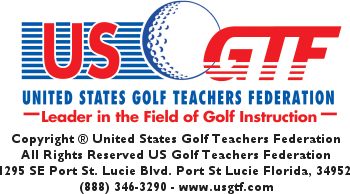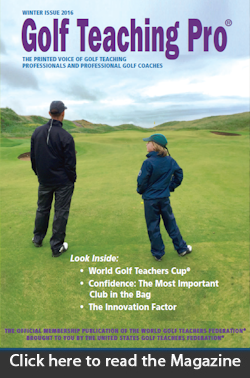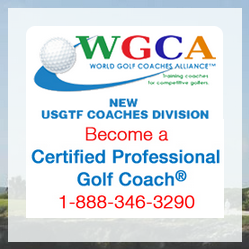Top Tips on How Golfers Can Build and Keep Confidence for Peak Performance
Having the ability to be confident is really one of the building blocks to life. Without it, there is no belief that we can succeed. Success is what keeps us motivated to participate in golf and in life.
The hard part about confidence is that it seems to hinge on so many things: Success, never losing or making a mistake, how others talk about us, and the expectations of coaches, parents, spouse, kids, and friends. The even more devastating part about confidence is that, for many, one perceived mistake or a loss negatively impacts the rest of their athletic history. Being so hard on oneself can lead to disaster. In the above example, there are many areas one can focus on, but since confidence is at the root, that is what I am going to talk about.
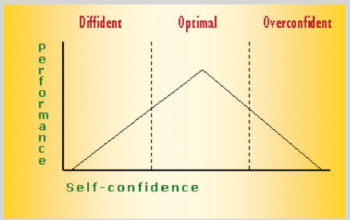 What is self-confidence?
What is self-confidence?
Self-confidence is a realistic belief or expectation of achieving success. It includes:
- What you realistically expect to do
- Your innermost thoughts about your realistic capabilities
- A realistic judgment about what you are able to do
How does having self-confidence impact performance?
- Lowers anxiety by creating positive expectations of success
- Increases motivation by raising perceived competence
- Enhances concentration by eliminating distraction from negative thoughts and personal putdowns
State versus trait
In fairly new research, it has been shown that humans are born with a level of confidence. Some people are born with lower confidence and others a bit higher. An example of this is my Olympic athletes. All of them have wanted to work on having more confidence, but they’ve had enough confidence to already compete in 1-2 Olympic Games. This example is quite different than someone who is struggling on a daily basis to be a confident person, such as an employee, spouse, or parent. One is not better than the other, and in both examples, confidence can be increased, but it does prove that there are different levels of confidence. You’ve probably seen this in your daily life. There are those people who feel like they can’t do anything while others feel like they can do some things, and still others that feel like they can do anything.
There are two kinds of confidence: state and trait. Trait is the amount of confidence you are born with. It’s what will determine your starting level of confidence in any given situation. State is situational. You will be more confident in certain situations and less so in others. The situations where you are usually less confident include new and perceived-pressure situations. If your trait confidence is lower, it will impact you differently than if you are starting off at 75 percent, and this affects state confidence.
If your trait confidence (general confidence) is 75 percent, you are not going to drop below 75 percent. Your lack of state confidence is as scary and filled with anxiety as it is for anyone, but your trait confidence is what keeps you going, while performers with lower trait confidence find it difficult to keep going.
What are the three types of self-confidence?
- Optimal self-confident athletes: Believe in their competence; possess the knowledge, strategies, skills and abilities necessary for success and preparation; sufficiently prepared so they can successfully perform those skills and strategies in a particular competitive situation.
- Diffident athletes: Confuse what is with what they wish would be or with what ought to be. They see themselves as losers and act accordingly. Mistakes devastate their competence. Self-doubts fuel self-fulfilling prophecies that create a vicious negative spiral. They focus on their shortcomings and overlook their accomplishments. They tend to be underachievers whose confidence limits their development.
- Overconfident athletes: People who believe they are better than they really are and have an inflated opinion of themselves and their skills. They overestimate their abilities while underestimating their opponents’ skills. They require pampering from parents/coaches. Often, they are competent but don’t prepare adequately.
Optimal self-confidence puts athletes in a great place to perform at their best. Diffident athletes don’t have enough confidence, and overconfident athletes have too much. As with anything, balance is important. How do you help your golfers boost their confidence?
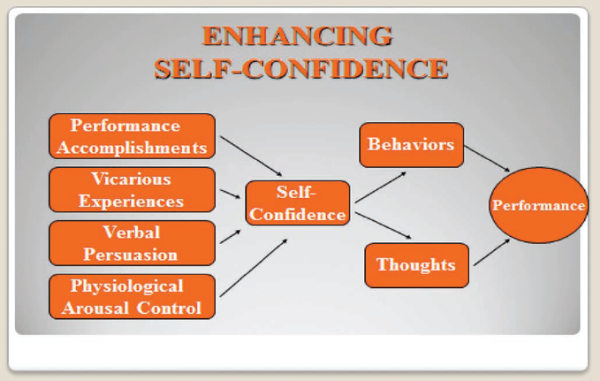
What are some specific strategies you use to boost your golfers’ self-confidence?
- Performance accomplishments: Help your players set realistic goals. Meeting goals builds motivation and confidence.
- Vicarious experiences: Help your golfer see exactly what they should be doing by using imagery. Imagery reinforces muscle memory and the ability to do it the right way.
- Verbal persuasion: Positive reinforcement enhances feelings of competence. I understand that sports are all about “sucking it up” and “it’s not all roses.” However, completely placing the focus on change and mistakes is not helping to enhance your golfer’s performance. It’s important to reinforce what they are doing well and on a consistent basis.
- Arousal control: Help your players find ways to deal with anxiety. I work with golfers and I play golf (on occasion), so I know that it is very anxiety-producing, at the start and all the way through.
There are many other strategies that you can use to help your players boost their confidence, but here are a few more thoughts on maintaining competitive confidence:
- Appraise situations as challenges rather than threats
- Develop plans that emphasize solutionfocused coping strategies to reduce threats
- Focus on the process as it is more controllable
- Learn to be present
- Be aware of the successful moment
What else impacts confidence?
Losing or having a high score definitely impacts a golfer’s confidence. Once that gets into the head of a golfer, it’s hard to let it go. Expectancies of coaches and others can also significantly raise or lower a golfer’s self-confidence. Here is the cycle of coaches’ expectations and how it affects your athletes:
Step 1: Coaches form expectations on person cues: What race, gender, socioeconomic status, size, body type, style of dress, etc. (first impressions). They consciously form expectations based on performance information: Conditioning and skills tests, previous performance history, through others’ evaluations, etc.
Step 2: Coaches’ expectations impact coaching behaviors. It impacts the type, frequency, and warmth of their interactions. It also impacts instructional behaviors (e.g., skills taught, difficulty of skills, and persistence). Finally, it impacts their feedback behaviors (e.g., valence, specificity, and corrective content) and attributions for success and failure.
Step 3: Coaches’ behavior impacts player performance. It impacts the quantity and quality of learning. It impacts the quality of competitive cognitions and performance and long-term development.
Step 4: Golfers’ performance conforms to coaches’ expectations (self-fulfilling prophecy). Players most susceptible to self-fulfilling prophecy effects are younger, less experienced, have lower self-esteem, are more coachable, and value success more. There are numerous ways to use this information. Here are a few:
- As a coach, be aware of your expectations and how you project them onto your players
- Help your players realize their expectations
- Help your golfers be aware of how others’ expectations affect their ability to perform (conformity)
- Support your golfers’ need to understand andask for the kind of feedback they need
- Support your golfers’ need to understand and ask for the kind of instruction they need, but let them know that they might not always get what they want
- Help your players focus on what’s in their control
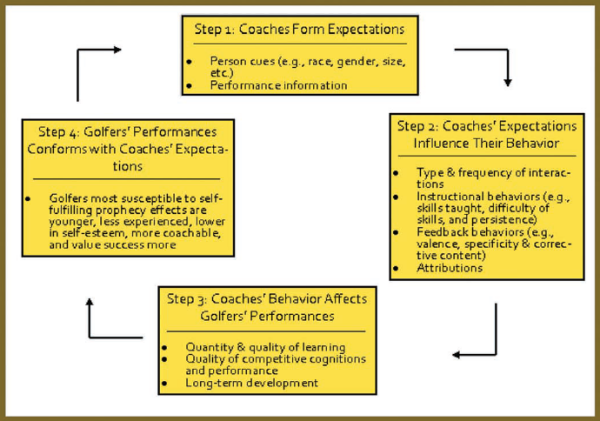
In conclusion
Confidence is important for the success of your golfers. You play a direct and indirect role in that confidence, and it’s important to understand your role. It’s also important to know that not only can you positively impact your players’ physical game, but you can positively impact their mental game. One piece of that impact is helping them to increase their confidence.
Dr. Cleere’s passion is unlocking the power of the mind so that elite performers can play better and happier. She has helped hundreds of athletes who compete in sports that require a high degree of mental endurance and toughness such as tennis, golf, triathlon, marathon, cycling, biathlon, and beach volleyball. She has also worked with concert musicians, entertainers, and business executives. For more information on confidence or other
performance-related challenges, visit Dr. Cleere’s website at www.DrMichelleCleere.com, or for a free consultation contact Dr. Cleere at drmichelle@drmichellecleere.com.


